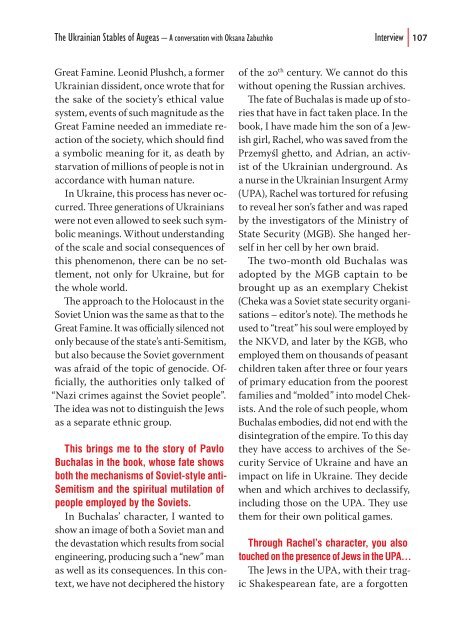Create successful ePaper yourself
Turn your PDF publications into a flip-book with our unique Google optimized e-Paper software.
The Ukrainian Stables of Augeas – A conversation with Oksana Zabuzhko<br />
Great Famine. Leonid Plushch, a former<br />
Ukrainian dissident, once wrote that for<br />
the sake of the society’s ethical value<br />
system, events of such magnitude as the<br />
Great Famine needed an immediate reaction<br />
of the society, which should fi nd<br />
a symbolic meaning for it, as death by<br />
starvation of millions of people is not in<br />
accordance with human nature.<br />
In Ukraine, this process has never occurred.<br />
Th ree generations of Ukrainians<br />
were not even allowed to seek such symbolic<br />
meanings. Without understanding<br />
of the scale and social consequences of<br />
this phenomenon, there can be no settlement,<br />
not only for Ukraine, but for<br />
the whole world.<br />
Th e approach to the Holocaust in the<br />
Soviet Union was the same as that to the<br />
Great Famine. It was offi cially silenced not<br />
only because of the state’s anti-Semitism,<br />
but also because the Soviet government<br />
was afraid of the topic of genocide. Offi<br />
cially, the authorities only talked of<br />
“Nazi crimes against the Soviet people”.<br />
Th e idea was not to distinguish the Jews<br />
as a separate ethnic group.<br />
This brings me to the story of Pavlo<br />
Buchalas in the book, whose fate shows<br />
both the mechanisms of Soviet-style anti-<br />
Semitism and the spiritual mutilation of<br />
people employed by the Soviets.<br />
In Buchalas’ character, I wanted to<br />
show an image of both a Soviet man and<br />
the devastation which results from social<br />
engineering, producing such a “new” man<br />
as well as its consequences. In this context,<br />
we have not deciphered the history<br />
Interview 107<br />
of the 20 th century. We cannot do this<br />
without opening the Russian archives.<br />
Th e fate of Buchalas is made up of stories<br />
that have in fact taken place. In the<br />
book, I have made him the son of a Jewish<br />
girl, Rachel, who was saved from the<br />
Przemyśl ghetto, and Adrian, an activist<br />
of the Ukrainian underground. As<br />
a nurse in the Ukrainian Insurgent Army<br />
(UPA), Rachel was tortured for refusing<br />
to reveal her son’s father and was raped<br />
by the investigators of the Ministry of<br />
State Security (MGB). She hanged herself<br />
in her cell by her own braid.<br />
Th e two-month old Buchalas was<br />
adopted by the MGB captain to be<br />
brought up as an exemplary Chekist<br />
(Cheka was a Soviet state security organisations<br />
– editor’s note). Th e methods he<br />
used to “treat” his soul were employed by<br />
the NKVD, and later by the KGB, who<br />
employed them on thousands of peasant<br />
children taken after three or four years<br />
of primary education from the poorest<br />
families and “molded” into model Chekists.<br />
And the role of such people, whom<br />
Buchalas embodies, did not end with the<br />
disintegration of the empire. To this day<br />
they have access to archives of the Security<br />
Service of Ukraine and have an<br />
impact on life in Ukraine. Th ey decide<br />
when and which archives to declassify,<br />
including those on the UPA. Th ey use<br />
them for their own political games.<br />
Through Rachel’s character, you also<br />
touched on the presence of Jews in the UPA…<br />
Th e Jews in the UPA, with their tragic<br />
Shakespearean fate, are a forgotten



